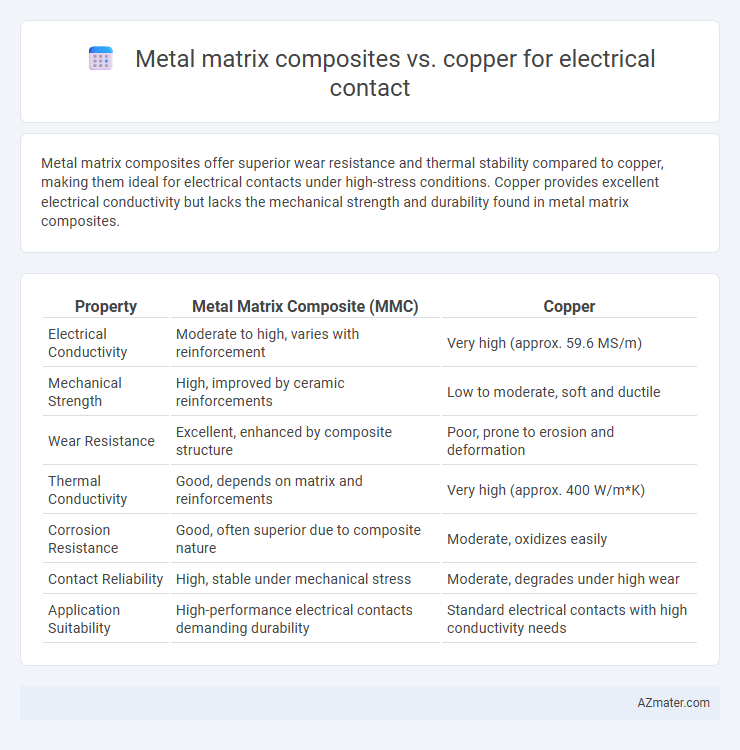Metal matrix composites offer superior wear resistance and thermal stability compared to copper, making them ideal for electrical contacts under high-stress conditions. Copper provides excellent electrical conductivity but lacks the mechanical strength and durability found in metal matrix composites.
Table of Comparison
| Property | Metal Matrix Composite (MMC) | Copper |
|---|---|---|
| Electrical Conductivity | Moderate to high, varies with reinforcement | Very high (approx. 59.6 MS/m) |
| Mechanical Strength | High, improved by ceramic reinforcements | Low to moderate, soft and ductile |
| Wear Resistance | Excellent, enhanced by composite structure | Poor, prone to erosion and deformation |
| Thermal Conductivity | Good, depends on matrix and reinforcements | Very high (approx. 400 W/m*K) |
| Corrosion Resistance | Good, often superior due to composite nature | Moderate, oxidizes easily |
| Contact Reliability | High, stable under mechanical stress | Moderate, degrades under high wear |
| Application Suitability | High-performance electrical contacts demanding durability | Standard electrical contacts with high conductivity needs |
Introduction to Electrical Contact Materials
Electrical contact materials require high electrical conductivity, mechanical strength, and wear resistance, making copper a traditional choice due to its excellent conductivity and thermal properties. Metal matrix composites (MMCs) offer enhanced performance by combining metals like copper or aluminum with reinforcements such as ceramics, improving hardness, erosion resistance, and durability under electrical arcing conditions. The integration of MMCs in electrical contacts addresses limitations of pure copper, including susceptibility to wear and thermal deformation, thereby extending contact life and reliability in demanding applications.
Overview of Metal Matrix Composites (MMCs)
Metal Matrix Composites (MMCs) consist of a metallic matrix reinforced with ceramic or metallic fibers, enhancing mechanical strength, thermal conductivity, and wear resistance compared to pure metals like copper. MMCs tailored for electrical contacts offer improved hardness and reduced arc erosion while maintaining sufficient electrical conductivity. This makes MMCs advantageous in high-performance and high-current applications over traditional copper contacts, which are prone to deformation and welding under electrical stress.
Properties of Copper as an Electrical Contact
Copper exhibits excellent electrical conductivity, typically around 5.96 x 10^7 S/m, making it one of the most efficient materials for electrical contacts. Its high thermal conductivity, approximately 401 W/m*K, effectively dissipates heat generated during current flow, reducing contact resistance and enhancing longevity. Copper also provides good mechanical strength and corrosion resistance, essential for reliable and durable electrical contact performance under various operating conditions.
Electrical Conductivity Comparison
Metal matrix composites (MMCs) used in electrical contacts typically combine metals like copper or silver with ceramic reinforcements, offering improved wear resistance and mechanical strength while maintaining reasonable electrical conductivity. Pure copper exhibits superior electrical conductivity, approximately 5.96 x 10^7 S/m, making it highly efficient for electrical contact applications but is prone to wear and deformation under electrical arcing. MMCs, depending on the reinforcement type and volume fraction, generally show reduced conductivity compared to pure copper, often ranging between 60% to 90% of copper's conductivity, balancing enhanced durability with acceptable electrical performance.
Thermal Performance Analysis
Metal matrix composites (MMCs) outperform copper in electrical contact applications due to their superior thermal conductivity combined with enhanced mechanical strength. MMCs such as copper-graphite or copper-diamond composites exhibit reduced thermal expansion and improved heat dissipation, minimizing thermal stress and contact degradation. The optimized thermal performance of MMCs ensures higher reliability and efficiency under high current densities compared to pure copper contacts.
Mechanical Strength and Durability
Metal matrix composites (MMCs) for electrical contacts offer superior mechanical strength and enhanced durability compared to pure copper, thanks to their reinforced microstructures that resist wear and deformation under high stress. Copper provides excellent electrical conductivity but tends to suffer from mechanical softening and erosion during repetitive electrical operations, reducing its lifespan. The integration of ceramic or carbide reinforcements within MMCs results in improved hardness and resistance to arc erosion, making them more reliable for heavy-duty electrical contact applications.
Wear Resistance and Longevity
Metal matrix composites (MMCs) outperform copper in electrical contacts by offering enhanced wear resistance due to their reinforced matrix, which maintains surface integrity under high friction and arcing conditions. MMCs exhibit improved longevity by reducing material degradation and contact surface erosion compared to pure copper, which softens and wears quickly under electrical load and mechanical stresses. These properties result in MMC-based contacts providing more reliable performance and extended service life in demanding electrical applications.
Corrosion Resistance and Environmental Impact
Metal matrix composites (MMCs) exhibit superior corrosion resistance compared to pure copper in electrical contact applications due to their enhanced microstructural stability and protective oxide layers. Copper, while highly conductive, is prone to oxidation and corrosion, especially in harsh environments, leading to performance degradation and increased maintenance costs. MMCs often incorporate corrosion-resistant reinforcements and require less frequent replacement, reducing environmental impact through lower resource consumption and waste generation over their operational lifespan.
Cost-Effectiveness and Manufacturing Considerations
Metal matrix composites (MMCs) offer superior wear resistance and thermal stability compared to copper, enhancing the lifespan and reliability of electrical contacts, which can lead to reduced maintenance costs. Copper, however, remains more cost-effective due to its lower raw material and manufacturing expenses, with established production processes that ensure high electrical conductivity and ease of fabrication. When evaluating cost-effectiveness, MMCs may justify higher upfront costs through durability and performance, while copper excels in applications prioritizing affordability and straightforward manufacturing.
Applications and Industry Recommendations
Metal matrix composites (MMCs) offer superior wear resistance and thermal stability compared to copper, making them ideal for high-performance electrical contacts in automotive and aerospace industries. Copper remains preferred in electrical distribution and consumer electronics due to its excellent electrical conductivity and cost-effectiveness. Industry recommendations emphasize MMCs for applications requiring enhanced mechanical durability and copper for standard conductors where electrical efficiency is critical.

Infographic: Metal matrix composite vs Copper for Electrical contact
 azmater.com
azmater.com